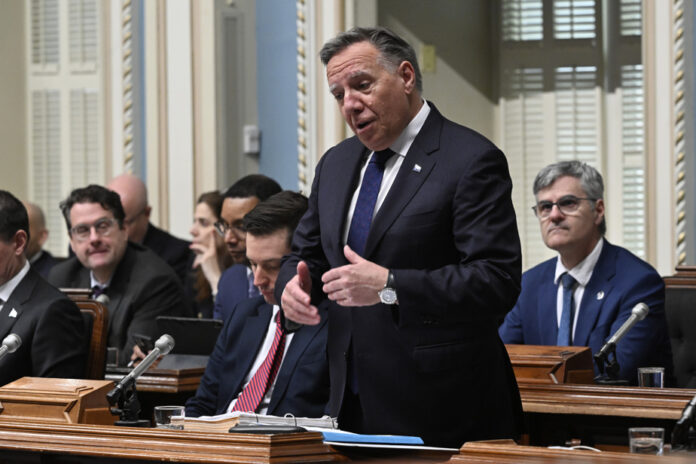(Quebec) To the municipalities that demand the creation of a “green pact” of 2 billion per year over five years to equip themselves with infrastructures adapted to climate change, François Legault closes the door again, but he promises in the same breath to new investments to help them deal with extreme weather events.
Before question period on Tuesday, the Prime Minister reacted to the heavy rains which caused flooding in certain regions of Quebec on Monday, in particular in Baie-Saint-Paul, in Charlevoix, where he will go on Wednesday.
“The watchword is safety. It can be powerful water and current when it’s unleashed. So do not take unnecessary risks. You have to make sure everyone is safe and stay away from those places,” he said.
Last fall, in the midst of the election campaign, the mayors of the 10 largest cities in Quebec formed a common front to demand that the government create a green pact of $2 billion per year over five years to help them adapt infrastructure to climate change.
However, Quebec does not intend to put in place the “green pact” that is demanded of it. François Legault explained his refusal because of the sums already allocated to adaptation to climate change (1.2 billion, financed by various ministries), specifying that the improvement of the plan for a green economy of 1.4 billion granted in the last budget will serve in part for this purpose.
And if more was to be invested now, who would pay? François Legault says taxpayers already have a high tax burden, which is why he is unable to accede to the cities’ request.
“It is not unlimited what can be added, both on the property tax of municipalities and on the income taxes of the Government of Quebec. […] We will continue to do our part. Municipalities also need to do their part. It’s nice to talk about diversifying income, the fact remains that it’s always the same taxpayer who pays and that income taxes by the Quebec government are very high, “he said.
For the leader of Québec solidaire (QS), Gabriel Nadeau-Dubois, additional investments now to adapt to climate change would allow cities and the province to save money later, by having fewer repairs to make on infrastructure damaged.
In a press briefing on Tuesday, Mr. Nadeau-Dubois asked Quebec to create a climate emergency fund “to make money available to people who are on the ground and who are already dealing with climate change”.
“I extend my hand to Premier François Legault. I ask him to listen to the requests, the calls for help from the municipalities of Quebec who say it: climate change has begun. You have to adapt, you have to prepare. It’s going to be expensive. Help us. I think we have to help them,” he said.
The leader of the Parti Québécois (PQ), Paul St-Pierre Plamondon, also supported the request of the mayors of the big cities of Quebec.
“The last campaign was an important moment because it made it possible to realize that some parties were taking the issue of climate change seriously and others were doing what the CAQ often does, which is to say half- measures. […] Unfortunately, no, we don’t see any sign of a government that is really taking this seriously,” he said.
The interim leader of the Liberal Party of Quebec (PLQ), Marc Tanguay, did not go as far as the other opposition parties. According to him, the redefinition of the fiscal pact between the government and the municipalities is “a great opportunity” to position adaptation to climate change as a factor of expenditure.
“When the tragedy happens, [it’s okay] to invest the funds to repair and to contain, but what can we do upstream? It’s going to take money,” he said.


















